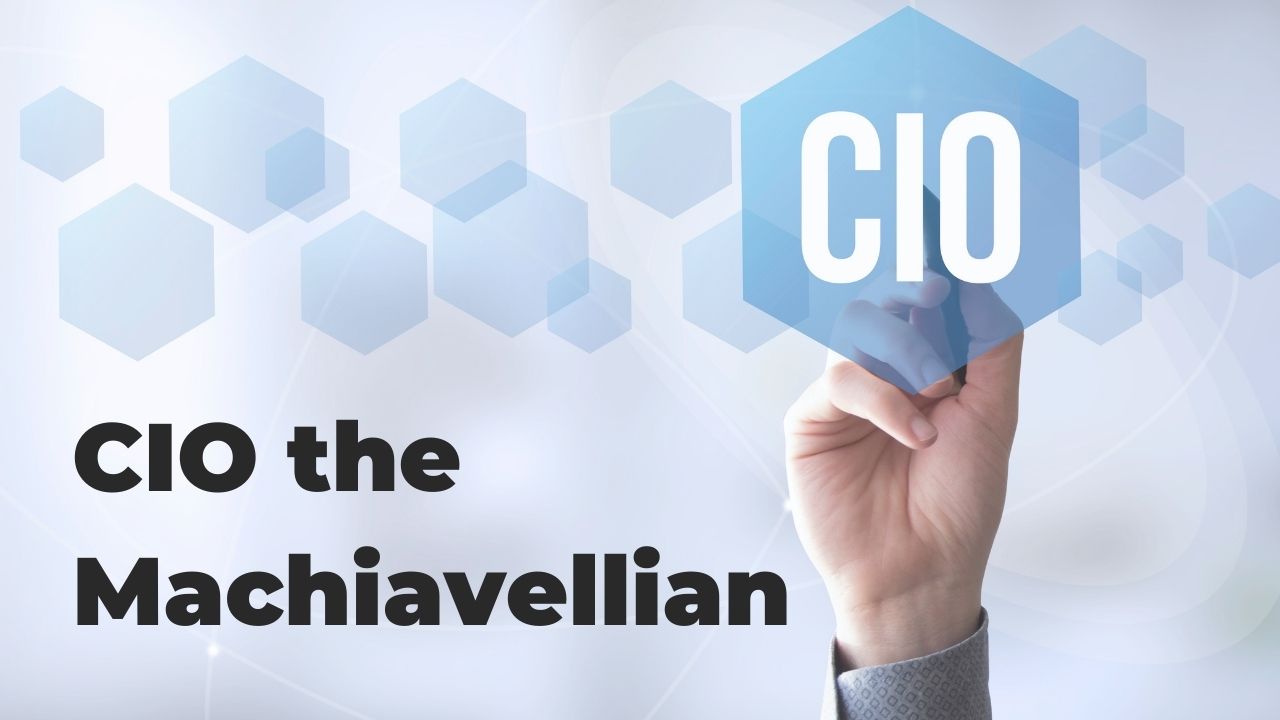CIO
The Machiavellian

Definition
Machiavellianism is a personality trait that denotes cunningness, the ability to be manipulative, and a drive to use whatever means necessary to gain power. Machiavellianism is one of the traits that forms the Dark Triad, along with narcissism and psychopathy.
Machiavellians are sly, deceptive, distrusting, and manipulative. They are characterised by cynical and misanthropic beliefs, callousness, a striving for … money, power, and status, and the use of cunning influence tactics.
Machiavellianism refers to the quality of being deceptive and manipulative to reach one’s goals. As Italian political philosopher Niccolo Machiavelli implied, you’re either predator or prey and the animal you most resemble determines your position on the food chain.
Where am I going with this I hear you asked with respect to the title of today’s article, CIO the Machiavellian?
Types of CIO
There are 2 types of Chief Information Officers aka CIOs, namely, Strategic CIO and Operational CIO. The majority of CIOs I know in Malaysia are more operational than strategic. Is one more important than the other? No, in my humble opinion, BUT the CIO’s career is far from over. Smart IT leaders are helping organisations embrace business change in the digital age. This continued transformation shows that forward-thinking CIOs must assume a strategic position and eschew the operational role traditionally associated with the IT director.
CIOs increasingly hear demands from chief executives to be more strategic and to add value through the adoption of innovative technology, like smart mobile devices and social networking tools. CIOs must balance the daily needs and operations of the business with strategic activities and the thought leadership that sets the direction for enterprise IT. The future role of the CIO has to be about change and the ability to show an organisation how innovative technology can create benefits for internal and external users.
CIO’s Responsibility
The daily job for most CIOs is often still operationally focused and centred on keeping the lights on, but in terms of looking forward, the IT leadership role has to be about change. Yet the long-term strategic aim of the CIO has to be to create an IT strategy for the organisation that is digital by default. CIOs must act as canny executives, ensuring worker demands for access to technology are assessed against business demands for information security and organisational efficiency.
So, should a CIO be technical? No, a CIO needs to be a technologist. The CIO needs to be the most senior person in charge of maintaining the company’s IT infrastructure. Their job is to provide direction and future planning for information technology. It is not sufficient for a CIO to be operationally good. If the CIO only does that, he/she will be viewed by the business as someone who simply manages technology, and IT is too important to the modern business to allow that to happen.
The crucial role of technology meant that technology professionals cannot afford to sit in the back office. Today’s IT leaders must engage across the business, communicating in a form that other executives can understand. And this begs the question in the riddle, What’s the difference between the Mafia and a Glaswegian? It begs the answer, The Mafia makes an offer you can’t refuse. The Glaswegian makes an offer you can’t understand. An organisation wants people who can talk about service quality and business improvement technology, and senior executives do not want a CIO who only talks about theory. CIO needs to be credible in delivery also. The CIO has to be much more strategic and operate on behalf of the business.
Machiavelli
In the 15th/16th century, Niccolò Machiavelli advised that a leader should think like an animal because leaders are often embattled and suggested leaders should take inspiration from two beasts, the fox to avoid the traps and the lion to scare away the wolves. Machiavelli is controversial because he advocates using expedient tactics that contradict universally admired qualities such as loyalty, honesty, and integrity. The author wishes to disclaim he is not promoting nor encouraging against the universally admired 3 qualities.
Far from it and if the reader can find or see (some) positives in Machiavellian, one will appreciate Machiavelli’s quote when he stated this, It is better to be feared than loved if you cannot be both.

Conclusion
In conclusion; to the Strategic CIO or otherwise, here are 10 Machiavellian quotes to ponder and digest:
1. Strategize Like an Animal
Because animals are often embattled and hunted. Just as CIOs are threatened by the extraordinary rate of change in IT, increased expectations and shrinking revenues and resources.
2. Avoid the Weaknesses of Your Inner Lamb
Many execs want to be a good-guy boss, but it doesn’t mean you should say “yes” when “no” is necessary, just to be liked.
3. Tap Into Your Inner Good Wolf
An effective leader of the pack knows how to use positive incentives and collaboration to create IT staff loyalty and commitment.
4. Recognise the Power—and Vulnerabilities—Created by Money
A big IT budget means you and your department command clout. But it makes you a target for criticism and defunding, especially if you haven’t achieved success and a strong ROI.
5. Delegate Power Thoughtfully
Your capability to maintain power is only as strong as the weakest link to who you entrust it.
6. Practice the Good Use of Power
Power can corrupt but not if you view it as a means of making positive things happen for your organisation and department.
7. Don’t Over-Seek Input
You should only ask for input when it’s needed to improve the outcome of an IT initiative—not because you want everyone to feel included.
8. Take Calculated Risks
When research and knowledge results in gambles that pay off, you build a reputation as a visionary to be taken seriously.
9. Prepare for Expanded Turf to Manage
The scope of what a CIO oversees will only grow over time, as nearly all major, mission-critical organisation initiatives simply can’t exist without IT.
10. Know When Not to Fight
Strong leaders know when a battle is a likely loss proposition. They live to fight another day for a more worthwhile and winnable opportunity.
Catch When Expert Meets Expert by Eugene Chung articles every bi-weekly Tuesday. Don’t forget to subscribe to stay connected. You are also encouraged to ask questions and seek advice from him.
Share this post
Related Posts

Cybersecurity: Achieving the ‘Hole-in-One’ of Digital Defence
- 07 Nov 2023
- By:Bernadetta Septarini
- Category: When Experts Meet Experts (WEME)
Discover the connection between cybersecurity and sports with Tony Smith, Regional VP at WithSecure. Let’s achieve the ‘Hole-in-One’ of Digital Defense.

Beware of Scare Software aka Scareware
- 21 Nov 2022
- By:Eugene Chung
- Category: When Experts Meet Experts (WEME)
What is Scare Software or Scareware? Learn more about this Social Engineering technique that aimed to scare the victim with ArmourZero mentor Eugene Chung.

Job Hunting Tips for IT Graduates
- 14 Nov 2022
- By:Ts. Saiful Bakhtiar Osman
- Category: When Experts Meet Experts (WEME)
The job market is tough and competitive. Learn some tips on how to do job hunting for IT graduates from ArmourZero’s mentor and expert Ts. Saiful Bakhtiar.

Tips to Successfully Sell a Credible Cybersecurity Solution
- 07 Nov 2022
- By:Eugene Chung
- Category: When Experts Meet Experts (WEME)
How do Cybersecurity sales convince prospects to trust their services and/or products? Learn more about it from ArmourZero’s mentor and expert Eugene Chung.


